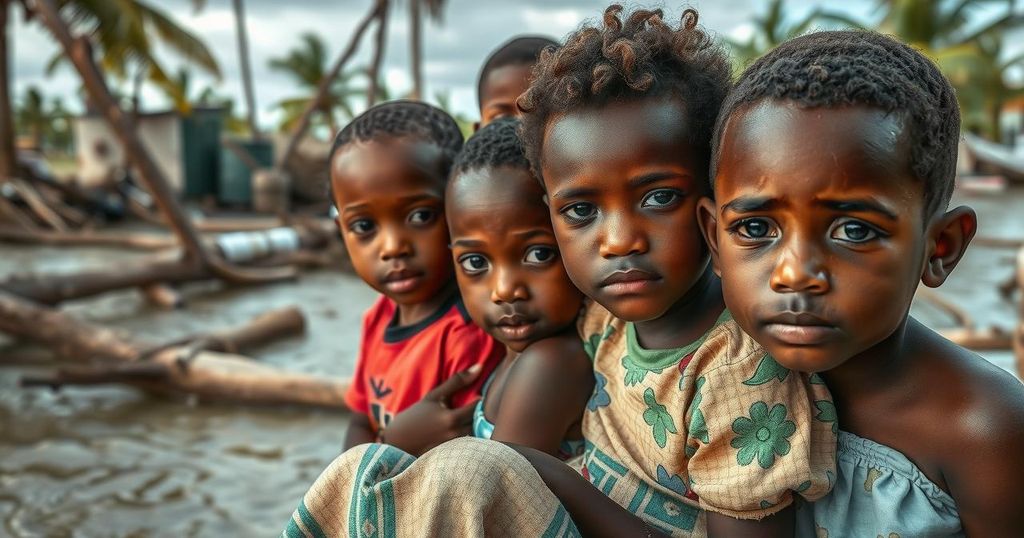Devastation from Cyclone Chido Affects 90,000 Children in Mozambique
Tropical Cyclone Chido has devastated northern Mozambique, impacting around 90,000 children and displacing thousands. Significant destruction includes over 35,000 homes and 186,000 classrooms. The UN is mobilizing emergency response efforts amidst an ongoing crisis due to previous conflicts and climate challenges in the region.
Tropical Cyclone Chido recently struck northern Mozambique, particularly affecting the Cabo Delgado province. The cyclone unleashed devastating torrential rains and fierce winds, leading to the destruction of over 35,000 homes and displacing thousands of families. The United Nations Children’s Fund (UNICEF) reported that approximately 90,000 children have been significantly impacted. Current evaluations suggest that at least 174,000 individuals are affected, with damages to infrastructure including 186,000 classrooms and 20 health facilities as the storm battered the region.
Cyclone Chido made landfall close to Pemba city, causing extensive damage to roofs and civilian infrastructure while disrupting electricity and communication services. Mary Louise Eagleton, UNICEF Representative in Mozambique, noted that “Mozambique is considered one of the most affected countries in the world by climate change and children were already experiencing several life-threatening emergencies before Cyclone Chido, including conflict, drought, and disease outbreaks.”
Mozambique faces severe challenges due to over seven years of conflict in Cabo Delgado, which has resulted in over 1.3 million internally displaced individuals, primarily women and children. The cyclone has exacerbated the struggle for those trying to recover, as it has washed away previously scarce resources. The storm also damaged additional infrastructure in Nampula and Niassa provinces, leaving more than 25,000 families without electricity and affecting water supplies.
UN agencies are working tirelessly to address the needs of the affected population. Within 48 hours of the cyclone’s landfall, the UN Refugee Agency (UNHCR) provided emergency relief including blankets and shelter supplies in Pemba. According to preliminary assessments from UNHCR’s spokesperson Eujin Byun, approximately 190,000 individuals urgently require humanitarian assistance, with numerous schools and homes reported destroyed.
In response to the unfolding crisis, UN Secretary-General António Guterres indicated that UN teams in the region are delivering emergency aid, while the Emergency Relief Coordinator Tom Fletcher allocated $4 million towards early humanitarian response. Furthermore, the World Food Programme (WFP) is prepared to escalate its operations to assist those most impacted by the cyclone amidst looming food insecurity affecting an estimated 3.3 million people throughout Mozambique.
Cyclone Chido represents a severe humanitarian crisis in Mozambique, a country that has been significantly affected by climate change and ongoing conflicts. The cyclone’s arrival exacerbated existing hardships faced by communities in Cabo Delgado province, which has endured remarkable levels of violence, displacement, and poverty. The UN has consistently highlighted the multi-faceted crises, including disease outbreaks and food insecurity, impacting the region. Understanding the broader context of these challenges emphasizes the urgency of response measures following the cyclone’s devastation.
In summary, Tropical Cyclone Chido has inflicted severe repercussions on northern Mozambique, particularly concerning children and vulnerable communities. With significant damage to infrastructure, homes, and critical services, the situation necessitates immediate and robust humanitarian responses from the UN and other organizations. As the assessment of damage continues, it is crucial for agencies to deliver sustained support to aid recovery and rebuild lives in affected areas.
Original Source: news.un.org




Post Comment